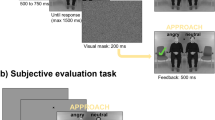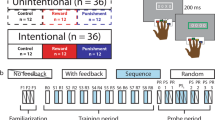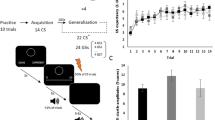Abstract
Two theories currently exist to explain the retarding effect of partial reward on the extinction of a learned behaviour. Amsel1,2 has suggested a theory based on the thesis that the shortcomings (non-reward) of a partial reward schedule generate frustration, experience of which reduces the reaction to the frustration induced by extinction. We shall here refer to this as the “frustration tolerance” theory. Sutherland3,4, on the other hand, has proposed a theory based on the assumption that partially rewarded animals switch attention more often than consistently rewarded animals and therefore learn about more cues. During extinction the responses to all the cues which the animals have learned about during training have to become extinguished. This suggests that the more cues learned about the longer it takes to extinguish the responses to them. We shall refer to this as the “incidental-learning” theory.
This is a preview of subscription content, access via your institution
Access options
Subscribe to this journal
Receive 51 print issues and online access
$199.00 per year
only $3.90 per issue
Buy this article
- Purchase on Springer Link
- Instant access to full article PDF
Prices may be subject to local taxes which are calculated during checkout
Similar content being viewed by others
References
Amsel, A., Psychol. Bull., 55, 102 (1958).
Amsel, A., Psychol. Rev., 69, 306 (1962).
Sutherland, N. S., Brit. Med. Bull., 20, 54 (1964).
Sutherland, N. S., Endeavour, 23, 148 (1964).
McGonigle, B. O., McFarland, D. J., and Collier, P., Nature, 214, 531 (1967).
McFarland, D. J., Quart. J. Exp. Psychol., 18, 19 (1966).
Sutherland, N. S., Quart. J. Exp. Psychol., 18, 289 (1966).
Author information
Authors and Affiliations
Rights and permissions
About this article
Cite this article
MCFARLAND, D., MCGONIGLE, B. Frustration Tolerance and Incidental Learning as Determinants of Extinction. Nature 215, 786–787 (1967). https://doi.org/10.1038/215786a0
Received:
Revised:
Published:
Issue Date:
DOI: https://doi.org/10.1038/215786a0
Comments
By submitting a comment you agree to abide by our Terms and Community Guidelines. If you find something abusive or that does not comply with our terms or guidelines please flag it as inappropriate.



